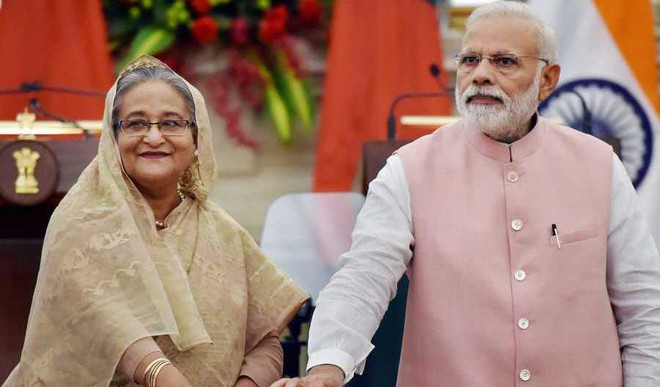India-Bangladesh relations

Copyright infringement is not intended
Context: Bangladesh signs agreement to purchase 420 broad-gauge railway wagons from India.
More about agreement:
- Project implementation: It will be done by joint funding of the Government of Bangladesh and Asian Development Bank (ADB) under the Rolling Stock Operation Improvement Project.
- Significance:
- These are high speed bogies with automatic air brake systems that can reach the destination safely at low cost and in less time.
- It will help improve freight transportation by replacing old wagons of Bangladesh railway.
- It will increase rail connectivity across the country and the neighbouring countries.
India-Bangladesh relation:
Background:
- The friendship between India and Bangladesh is historic, evolving over the last 50 years.
- India’s political, diplomatic, military and humanitarian support during Bangladesh’s Liberation War played an important role towards Bangladesh’s independence.
- Post-Independence, the India-Bangladesh relationship has oscillated as Bangladesh passed through different regimes.
- The relationship remained cordial until the assassination of Bangladesh’s founding President Sheikh Mujibur Rahman in August 15, 1975, followed by a period of military rule and the rise of General Ziaur Rahman who became President and also assassinated in 1981.
- It thawed again between 1982-1991 when a military-led government by General H.M. Ershad ruled the country.
- In the last decade, India-Bangladesh relations have warmed up, entering a new era of cooperation, and moving beyond historical and cultural ties to become more assimilated in the areas of trade, connectivity, energy, and defence.
Major Achievements of Indo-Bangla cooperation:
- Land Boundary Agreement in 2015: Bangladesh and India have solved their border issues peacefully by ratifying the historic Land Boundary Agreement in 2015, where enclaves were swapped allowing inhabitants to choose their country of residence and become citizens of either India or Bangladesh.
- Border security: The Bangladesh government led by Prime Minister Sheikh Hasina has uprooted anti-India insurgency elements from its borders, making the India-Bangladesh border one of the region’s most peaceful, and allowing India to make a massive redeployment of resources to its more contentious borders
- Trade: Bangladesh is India’s one of the biggest trading partner in South Asia. India has offered duty free access to multiple Bangladeshi products.
- Line of credit: On the development front, India has extended three lines of credit to Bangladesh in recent years amounting to $8 billion for the construction of roads, railways, bridges, and ports.
- Tourism: Bangladeshis make up a large portion of tourists in India, with one in every five tourists being a Bangladeshi. Bangladesh accounts for more than 35% of India’s international medical patients and contributes more than 50% of India’s revenue from medical tourism.
What are irritants in INDO-Bangladesh relationship?
- National Register of Citizens (NRC) and the Citizenship Amendment Act (CAA): Bangladesh had cancelled visits by ministers, and Hasina has expressed reservations about CAA. She commented that the CAA and the proposed nationwide NRC are “internal matters” of India, the CAA move was “not necessary”.
- China factor: China is the biggest trading partner of Bangladesh and is the foremost source of imports. India has provided developmental assistance worth $10 billion, but China has promised around $30 billion worth of financial assistance to Bangladesh to overcome India assistance. Bangladesh’s strong defence ties with China makes the situation complicated. China is the biggest arms supplier to Bangladesh and it has been a legacy issue.
How has India been engaging with Bangladesh post CAA?
- Cooperation during Covid: India and Bangladesh have cooperated on pandemic-related moves. India provided medical aid to Bangladesh.
- Railway cooperation: The two countries have also cooperated in railways, with India giving 10 locomotives to Bangladesh. The first trial run for trans-shipment of Indian cargo through Bangladesh to Northeast states under a pact on the use of Chittagong and Mongla ports took place in July.
- The two sides agreed that Implementation of projects should be done in a timely manner.
- Bangladesh sought return of the Tablighi Jamaat members impacted by the lockdown in India, and early release of the 25 Bangladeshi fishermen in custody in Assam.
What is the way ahead?
- Teesta project: While the Teesta project is important and urgent from India’s point of view, it will be difficult to address without West Bengal state government will.
- India should ensure time bound implementation of development projects or else, the latent anti-India sentiment in Bangladesh —, which has been revived after India’s CAA -NRC push — threatens to damage Dhaka-New Delhi ties.



1.png)
